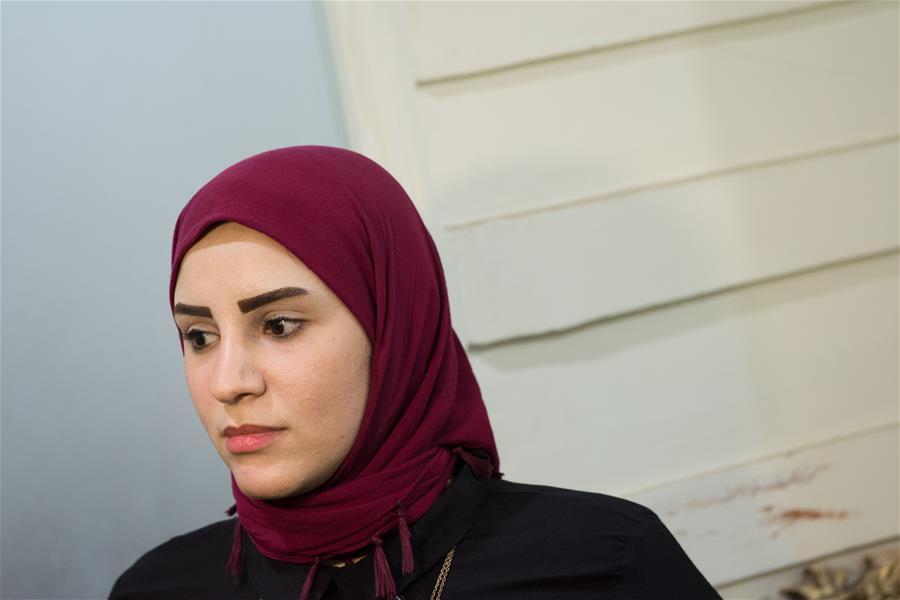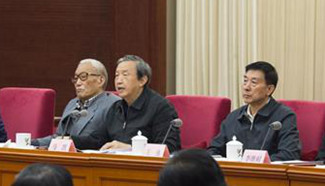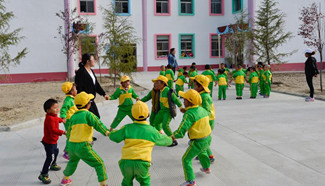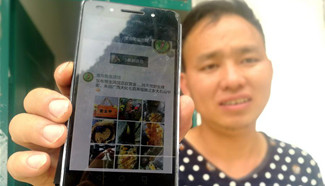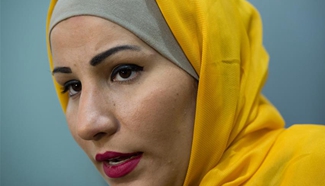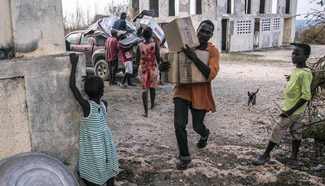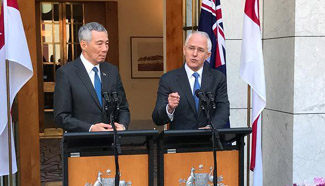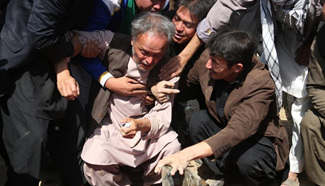Rania Saad, a competitor of the first "Miss Upper Egypt" final competition, receives an interview with Xinhua in Assiut city, Egypt, Oct. 10, 2016. The first "Miss Upper Egypt" final competition scheduled to be held in Assiut province on Monday was canceled as some of the participants in the competition received phone call threats from conservative fanatics. (Xinhua/Meng Tao)
by Mahmoud Fouly, Wang Xue
ASSIUT, Egypt, Oct. 12 (Xinhua) -- Women in Egypt, particularly those in male-dominant, conservative south, struggle to rise as effective and independent elements of society through education, work and social activities, including the recent attempt to hold first "Miss Upper Egypt" competition despite social, tribal and traditional rejection.
Around 250 females joined the initial stages of Miss Upper Egypt contest, with the consent of their families, then they have been filtered to 50 based on education and weight, who have gone through tests by linguistics, psychiatrists, sociologists and fashion designers until 10 women from Upper Egypt's provinces of Assiut, Sohag and Menia have been qualified for the finals.
Some of the participants in the competition received phone call threats from conservative fanatics and that seems to be the main reason why the hotel in downtown Assiut did not go on with hosting the competition, the first of its kind in Upper Egypt.
Although the current was too strong to swim against, and the conservative traditions won in the end to prevent Miss Upper Egypt final competition to be held in Assiut province on Monday as scheduled, the participants insist that they will not give up and they will keep on trying until "Miss Upper Egypt" comes to light.
Rania Saad, a 26-year-old veiled, highly-educated, working, married woman, came from further Sohag province to take part in the competition, said that she will join the contest again next year, noting that her husband as a traditional southern male refused the idea in the beginning.
"However, when he learned that the competition focuses more on a woman's education and knowledge rather than her physical beauty, he agreed and encouraged me to join," the young woman told Xinhua.
Although it lies in the middle of Upper Egypt, downtown Assiut city looks as busy and modern as the capital city Cairo, with hotels, modern vehicles, fast food restaurants, shopping malls and clothing stores in main Al-Gomhouriya Street and surrounding areas.
Khaled Mansour, pharmacist and organizer of Miss Upper Egypt, said that the mentality of some people has not yet been ready to think outside the traditional box, lamenting that some people misunderstood the idea of Miss Upper Egypt and took it as a taboo.
"Perhaps the people's awareness changes in the near future and the event becomes acceptable in the southern societies. We have the intention retry to hold Miss Upper Egypt," the man said.
The organizer argued that the contests do not contradict manners and principles and that it focused on the beauty of the soul, education, knowledge, manners and creativity of women. "That is why there have been veiled women in the finals," Mansour told Xinhua.
Compared to the urban parts of the country, Upper Egypt is generally known for poverty, less development and lower education that lead to social issues in the southern provinces such as marriage of minors, female circumcision, tribal feuds and others.
"It is sad that the competition was canceled. As an Upper Egyptian woman, I booked a ticket and really wanted to attend and see a new change in favor of women in Upper Egypt," a woman told Xinhua in Assiut, ironically preferring to keep her name anonymous "for traditional reasons."
Jordanian singer Nedaa Shrara, title holder of "The Voice" show as the best Arab voice, told Xinhua that she does not regret coming to Assiut as a guest in Miss Upper Egypt contest although the competition was canceled, hoping such barriers would be overcome one day soon.
"I faced similar challenges as a veiled singer, because many people think singing and being veiled don't match. There is nothing impossible. As I could realize my dream as a singer with hijab, I believe one day they will have Miss Upper Egypt," the singer told Xinhua, expressing happiness to go through this "adventure" anyway.
